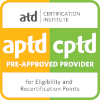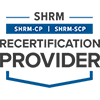Product Details
Topics Covered
- Big data and analytics
- Quantitative data
- Qualitative data
- Mixed-method research
- Forecasting and regression analysis
- Time series analysis
- Cluster analysis
- Decision analysis
- Factor analysis
- ANOVA
- Analytic tools
- Data collection
- Correlation vs. causation
- Reliability vs. validity
- Biases and errors of data collection
- Presenting data
- Data storage and disposal
- Confidentiality, privacy, and discrimination
Key Features
- Mobile-friendly
- Audio-enabled
- Badge and credit-awarding
- Real-world case studies
- Fully accessible
- Games & Flashcards
- Expert-supported
- Video content
Course Preview
Course Description
Learning Outcomes
- Explain the value of big data and analytics for human resource managers
- Identify different types of data that are useful for human resource managers
- Describe various ways of analyzing data
- Perform simple data analyses and understand some basic analytic tools
- Develop a plan for collecting data
- Understand the advantages and disadvantages of certain data types and collection methods
- Distinguish between correlation and causation
- Identify some biases and errors data collection may be subject to
- Present data in clear and compelling ways
- Consider the advantages and disadvantages of different ways to store data
- Reflect on some of the threats of big data, including threats to confidentiality and privacy as well as the potential for discrimination
Notes
This course has an "Ask the Expert" feature, which submits your questions directly to an expert in the field you are studying. Questions are answered as quickly as possible and usually within 24 hours.
As an Accredited Provider, MindEdge offers for its learning events that comply with the Continuing Education and Training Standard.
Learners must achieve an average test score of at least 70% to meet the minimum successful completion requirement and qualify to receive credit. Learners will have three attempts at all graded assessments.



